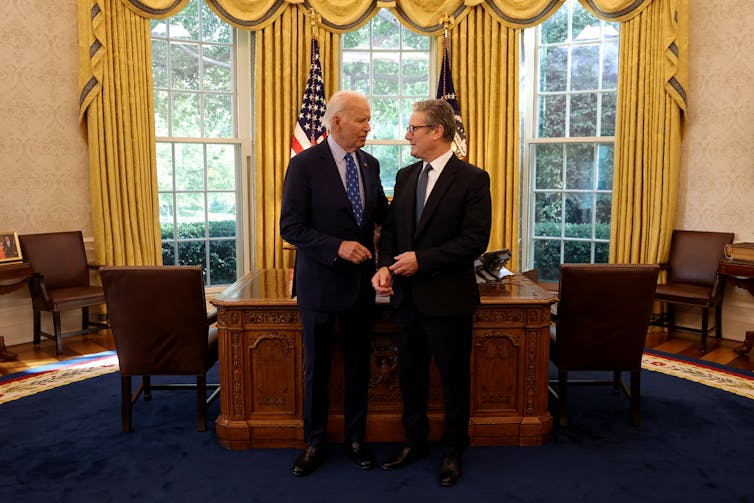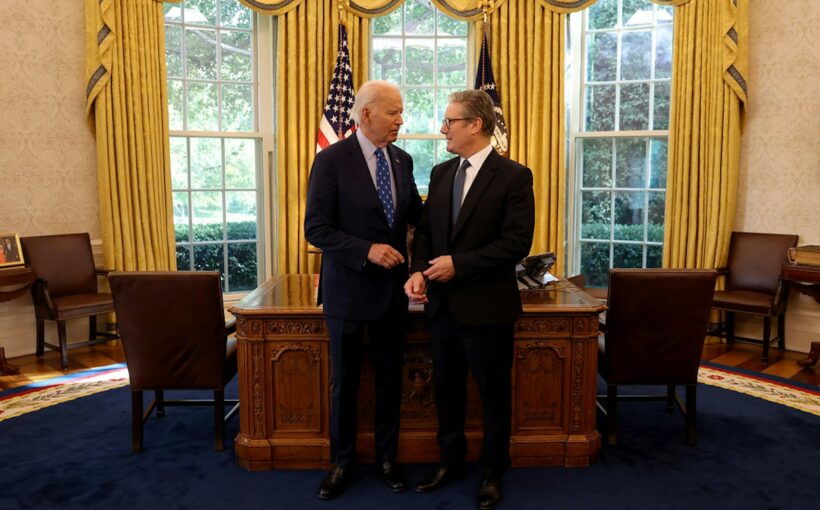With less than two weeks to go until the US presidential election, another surprise twist has emerged. Donald Trump has accused the “far-left” Labour party in the UK of election interference by sending volunteers to help the Kamala Harris campaign. This news must have come as a surprise to prime minister Keir Starmer.
The core of the accusations made by Trump and his team is that Labour was offering financial support to volunteers and helping them arrange accommodation for their trips to the US – and that this amounted to “illegal foreign national contributions” to the Harris campaign.
And at the centre of those accusations appears to be a now-deleted LinkedIn post from a Labour official saying she had “10 spots available” to campaign in North Carolina. Labour insists this did not mean any financial support was being offered. Labour figures have suggested the campaigning was being done by private citizens.
Trump’s lawyers filed a complaint with the Federal Elections Commission (FEC) against both the Labour party and the Harris campaign on October 22 claiming otherwise. And the finance point is key, since – under the rules of the FEC – foreign volunteers can assist a campaign, but only if they are unpaid. 10 Downing Street insists the campaigners associated with Labour were not being paid.
While there are important questions that need to be answered as to whether the Labour party did break US election rules, the questions about the implications of Trump’s accusations for US-UK relations are likely to be of even greater significance.
Regardless of whether Trump’s accusations are sustained by the FEC, they are likely to frame his perception of the Starmer government should he win the presidency in less than two weeks’ time. Labour has made improving relations with politicians on both sides of the aisle in Washington a priority. These efforts appear to have been undermined overnight with Trump’s accusations.
These accusations will likely be investigated after the election has been held. If Trump wins the presidency, he will have enormous influence over this investigation and the surrounding media coverage, which would be an unwelcome situation for Starmer to find himself in.

Potentially even more serious is the fact that if Trump loses, this could be the story that he focuses on to explain why he lost. It may seem trivial but triviality has not stopped Trump before. The suggestion that Labour helped Harris could prove just as useful to Trump as the unfounded claims of widespread “voter fraud” in 2020 that helped him seed an insurrection on January 6.
Whether the FEC finds that the role of Labour activists in the Harris campaign constitutes foreign interference or not, entanglement in this story is unlikely to help relations with either a Trump or a Harris White House.
UK invovlement in US elections
Foreign activists have long been involved in US election campaigning – and they do so on both sides.
The current UK foreign secretary, David Lammy, campaigned for Barack Obama in 2012. In 2017, the Australian Labor party was fined by the FEC for paying for their volunteer’s flights to the US to campaign for Bernie Sanders in Democratic primaries.
Indeed, the Trump campaign has used foreign activists and campaigners in the past. Before he decided to run for the seat of Clacton-on-Sea in July 2024, Nigel Farage claimed that he was going to devote his time to campaigning for Trump. Farage has repeatedly been on stage with Trump at his rallies. Former UK prime minister Liz Truss also attended the Republican National Convention in 2024, supporting Trump and calling Joe Biden, then the Democratic Party’s nominee, “weak”.
What is rare, however, is FEC scrutiny on all this campaigning. While the involvement of foreign volunteers is legal and normal in the US, the rules are rarely debated or tested by a legal probe. These accusations may initiate renewed attention to the issue, and potentially a change in these rules in future elections.
Importantly, while the coverage of Trump’s accusations against Labour and the Harris campaign have received huge coverage in the UK, attention in the US is limited. Much of the US media coverage has focused on allegations from John Kelly against Trump. Kelly, Trump’s former chief of staff, has accused Trump of being a fascist and of having said that he wished he had generals like “Hitler’s generals”. Trump’s claims about the UK have therefore received far less attention in the US than might have been anticipated. This will have diminished the impact of Trump’s claims with US voters, good news for the future. But Starmer should still be concerned about the impact on diplomatic relations.
As with many of Donald Trump’s accusations and more controversial comments, there are a lot of moving parts. Trump showed how important his own personal attitudes were in US diplomacy during his previous administration. He is unlikely to forget about these accusations anytime soon, whether he wins or loses.
![]()
Christopher Featherstone does not work for, consult, own shares in or receive funding from any company or organisation that would benefit from this article, and has disclosed no relevant affiliations beyond their academic appointment.



